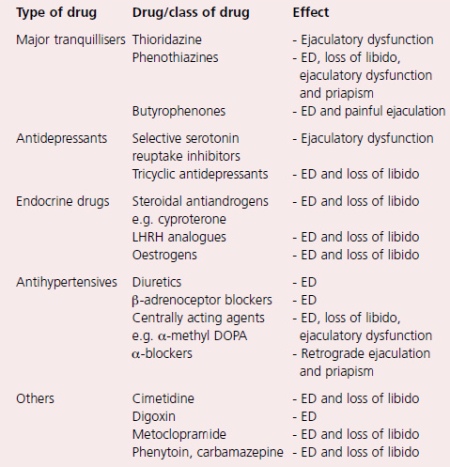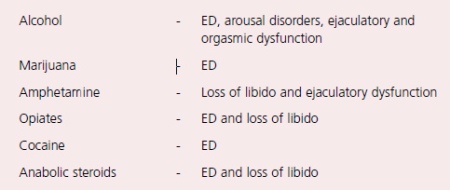A large number of drugs can impair sexual function, either by an effect upon erectile function, ejaculatory function or sex drive. Some of the more commonly used drugs are listed in table. Use of these drugs very rarely produces ED on their own, their action usually being an adjunct to another pathophysiological mechanism.
The sexual effects of recreational drugs are shown in table. Surgery and radiotherapy can also impair erectile function.
The commonest surgical cause of ED is radical pelvic surgery for rectal cancer, bladder cancer or prostate cancer. The parasympa- thetic nerves that subserve penile erection run adjacent to the prostate and are often damaged during such radical surgery. Techniques of surgery (in particular radical prostatectomy) have been devised with the aim of both nerve and potency preservation.
Other surgery that can lead to ED includes spinal surgery and surgery for Peyronie’s disease or for priapism, while radiotherapy for bladder, prostate or rectal cancer will often lead to delayed ED via a vasculogenic mechanism.
Conclusion
The pathophysiological mechanisms involved in the development of erectile dysfunction are many and varied. A number of mechanisms may be active in an individual, and nowhere is this more true than in men with diabetes. Around 50% of diabetic men can expect to develop ED, and pathophysiological mechanisms involved include peripheral autonomic neuropathy, large vessel atheroma, small vessel microangiopathy, endothelial dysfunction and psychological disorders.
In the general population, the commonest causes of ED are vascular, and there is increasing evidence that the risk factors for atherosclerosis, namely hypertension, smoking, hyperlipidaemia and diabetes, are all strongly associated with ED.
This has two important consequences.
- Firstly, control of these risk factors might be expected to reduce the risk of ED.
- Second, when men do present with ED, it is important to identify these risk factors, not only to potentially improve the ED, but also to try to prevent other future cardiovascular sequelae.

